- Home
- Barry Unsworth
The Partnership Page 2
The Partnership Read online
Page 2
‘I have heard that she is insatiable,’ Moss said, as though it were something like leprosy.
‘Who on earth says that? Anyway, it would be a misfortune, surely, if it were really true. Her morals don’t concern us in any case. What does it matter to me how many men she sleeps with? I like talking to her, she gives me the London news.’
Before this burst of frankness, Moss’s air of wisdom had wilted a little. ‘Everybody knows about her in the village,’ he said. ‘It’s up to you, of course.’
‘It’s not catching, you know,’ Foley said. ‘Do you think I’ll be corrupted, or what? Michael, you simply can’t consider people in this way. People aren’t just so many moral vitamins.’ Foley’s precarious sense of advantage led him into something like a sneer. ‘Tom’s all right, he’s a nutritious character, but keep away from Dick, he’ll constipate you, he’s deficient in citizenship, he has an uncontrollable impulse to expose himself on public commons and heaths.’
He paused for a moment to struggle with his idea. Moss was silent, as though staggered by this figurativeness.
‘Anyone can be poisonous, actually,’ Foley said. ‘People don’t give other people what is wholesome for them necessarily, even wholesome people, I mean. It’s a sort of surplus, whatever it is the person has a lot of. It depends on the system of the receiver whether it’s poisonous or not.’
His vehemence seemed finally to amuse Moss, who actually began to chuckle a little. ‘You must keep one foot on the ground, you know, Ronald,’ he said. ‘Idealism is all very well, but it doesn’t get the work of the world done.’
‘Idealism?’ Foley was sometimes bewildered by Moss’s apparent shifts of ground, suspecting some design in them; but he was always forced to acknowledge that so far from cunning was this inconsequence that Moss wasn’t even aware of it. Now, for example, he had simply fallen back, perhaps out of self-defence, on his role of hard-headed practical man.
‘I wasn’t being idealistic at all,’ Foley said, making an effort to break out of his own allotted role of fanciful fellow, in which indeed, because of Moss’s conviction, there was something hypnotic, compelling assent. ‘I was only trying –’
‘Never mind, never mind,’ said Moss, still smiling. He seemed in great good humour now, and Foley knew that this was because he himself was behaving in character, in Moss’s view at least. Moss had assigned to him from the beginning an Artistic Temperament – it was typical of him to think in broad categories – and this apparently implied a sort of picturesque ineptitude for the bread-and-butter aspects of life, rather than the possession of any definite talents. But in Foley’s case there was talent too, as Moss would have been quick to point out to anyone who seemed unaware of it. Was it not Foley who designed the pixies, made the models and the moulds? And he himself who did the heavy work, the crude preparatory processes, and kept the accounts?
Foley had found his elevation comfortable enough on the whole, and had acquiesced in it. But it was frustrating to be trapped, as he was now, unable to descend and explain his ideas without their being discounted in advance, dissolved in Moss’s indulgence. And it had had a subtly demoralising effect on Foley over the course of time, causing him to adopt poses gratifying to Moss – rather like a dog with a good trick. He moved vaguely towards the door, uttering in a declamatory tone, ‘There are more things in heaven and earth, Horatio, than are dreamed of in your philosophy.’ Suddenly afraid that Moss might think he was being mocked by being called Horatio, he added quickly, ‘That’s a quotation.’
‘I thought I recognised it,’ Moss said. ‘Wasn’t that the person who held the bridge?’
Foley was aware that having wrought on Moss he should leave immediately, but at the door he found himself insufficiently resolute for this, and plunged into further explanations.
‘I thought, you see, that if I took them down now the painter would have the rest of today and a clear day tomorrow and I could deliver them on Friday morning.’
‘Yes,’ said Moss, ‘and if we’re prompt in getting them in, and they are satisfied with them, they might be interested in this new design of yours, the one sitting on the Cornish pasty.’ He was constantly urging Foley to break new ground, conceiving it his duty to provide the drive, the dynamism, of the business. At one time he had even gone out with samples, but something too strenuous in his advocacy of the pixies had tended to put people off. Foley now did the prospecting for new business; his aloof approach usually succeeded very well. If this had wounded Moss he showed no signs of it.
Foley agreed with him about the Cornish-pasty line. It had definite possibilities, since it could so easily be adapted to demand. The pixie would remain the same, of course, no point in changing that, but the pasty itself could be changed into a little tray for putting things in, or a money-box. Also, he felt that the distinctively Cornish nature of the thing would be a selling point. People liked to have this regional reminder of their holiday. It was a peg for the year, a piece of evidence. Beside their far-flung hearths, on winter evenings, they would catch the eye of this Cornish-pasty pixie, and remember the wind and sunshine of their holiday, the boarding-house bed that creaked, the scandalising cockroach in the bathroom. Things ugly in themselves can none the less suggest beauty and perhaps for many this pixie leer would evoke the flight of gulls, the envied life of fishermen, a golden hitchless passage of adultery or a dazing win at Bingo.
‘You’ll be taking the car, I suppose,’ Moss said. ‘I hope you’ll drive carefully, Ronald.’
‘Yes, yes,’ said Foley, wincing inwardly. He hated discussing the car with Moss. It was a topic which made him feel particularly vulnerable. His partner’s last words had been a reference to the two minor accidents he had already had this year, caused by his habit of alternating when driving between exaggerated caution and euphoric abandonment, either of which moods was liable to descend on him at any time without warning, other than a tendency to whistle through his teeth during the latter. Moss himself was an unspectacular but steady driver who had never had an accident in his life.
‘Go slowly along those lanes,’ Moss said. ‘It’s better to be safe than sorry.’
Of course, thought Foley, it was too much to expect that Moss would see it was a distasteful subject, one that caused pain. Perceptions of that kind were foreign to him.
‘Well, I’ll be off then,’ he said, as stoically as possible.
‘That’s right, Ronald,’ Moss said. He turned back to his worktable, but almost immediately looked round again as though to add something. Foley, however, had gone.
Moss stood still, listening to the sounds from outside. The shed doors were unbolted, there was a brief pause and then the car coughed and stopped, coughed again in a prolonged manner and picked up. The engine ran while Foley put in the boxes, then the doors slammed shut, the gear jarring harshly a moment or two later, as he engaged bottom too vigorously.
Had he wished, Moss could have watched the car emerge from behind the house and turn up the lane that led to the road. His window gave him a view of all this. He did not raise his head, though, until the noise of the engine had completely died away. For some time longer he stood upright beside the bench, while into the silence left by the car’s departure a number of familiar sounds came seeping back: the cries of sheep from the surrounding fields, the faint bickering of gulls, the respirations of the hot ovens. Somewhere on the farm one of Royle’s dogs yelped as though in pain.
He resumed work in a deliberate manner. One after another he took the pixies out of their moulds, holding them gently, almost caressingly. The full daylight was flooding into the room now, sea-light, austere yet benign, without subtlety, blanching the filed pixies that stood in neat ranks on the bench before him.
While he was working he went over the conversation he had just had with Foley. On the whole he was inclined to be pleased with his part in it. He felt that he had shown tact, and tact was of paramount importance with Ronald, who had been so touchy lately, not like himself at all.
Someone was getting at him, of course, but you couldn’t ask him right out. Ronald couldn’t be reasoned with. He had shown that clearly enough the other night, flying up in the air like that and shouting so that all the dogs barked. Royle had probably heard every word. A wave of unhappiness swept over Moss as he thought of that quarrel, its pointlessness, Ronald’s pale indignant face. Ronald had looked at him as if he were an enemy. There had been no way of showing that what he wanted, wanted more than anything, was to help Ronald, advise him for his own good. He had had to stand there helpless, watching the antagonism in Ronald’s face, the terrible misunderstanding that was developing between them.
He thought of Ronald on his way to the village, nearly there by now. Four times in the last ten days he had made completely unnecessary trips to Lanruan. Moss counted them over again in his mind: one, two, three, four. He liked enumerating, marshalling the facts. There was no doubt about it. Ronald was seeing somebody down there, some girl. Nothing mattered, waste of petrol, loss of time. And the lies he told! Did he really think that he, Moss, whose finger was on the pulse of the business, would be ignorant as to whose turn it was for painting? It was Albert Smart’s turn. Even if he hadn’t known he had only to check up on the rota-sheet. A chill of fear struck Moss as it came home to him how careless and flimsy Ronald’s excuses had been. That could only mean he wanted desperately to see this person. Moss tried to concentrate his mind, to discover by a sort of intuition what she could be like, fighting as he did so the sick incoherence that was descending on his thoughts. He tried his hardest to be objective, to bear in mind her humanity, complex and irreducible; but in spite of his efforts he was unable to separate from this unknown girl the idea of flaccidity, the familiar female complement of Ronald’s slimness; soft, plasmic, absorbent. Striving to contain his disgust, Moss felt a prickle of sweat break on his upper lip.
He set the pixie he was holding, smooth now and indistinguishable from the others, carefully down on the bench. He felt the silence of the house all around him, like an invitation. The disagreeable thoughts of the girl receded, and a feeling of excitement began to stir him. After standing a few moments as though undecided, he went slowly out of the room and upstairs. He walked down the passage, past Foley’s workroom and his own bedroom, and stopped at the far end, at Foley’s bedroom door. After a long pause of complete immobility he opened the door and went in. He stood just inside the room looking round. This is seven times I have done this, he told himself, and out of habit checked the times over, beginning with the cold January day when the idea had first assailed him: one, two, three, four, five, six, seven. It was incontrovertible and gave him, he felt, a certain prerogative.
Foley kept his things always very neat, the bed made up, the floor swept, the room well aired. Near the window was a white-wood table surmounted by an oval mirror in a gilt frame. Foley used this table for his toilet accessories. On it were laid, meticulously arranged, his twin blue-glass eye-baths, his big blue tin of Nivea, his bottle of after-shave lotion and a pink plastic cup with a tube of toothpaste and a yellow tooth-brush in it. There was also, set a little apart from these, a large bottle of Cologne. Moss lifted this and read the manufacturer’s label. Then he removed the glass stopper and sniffed at the neck of the bottle. The sweetness expanded in the cool room.
After seven visits Moss had become very familiar with all these objects and he would have noticed immediately if anything had been missing or not in its accustomed place. They were like an extension of Ronald’s personality, attributes only observable in this way, in the silence of their owner’s absence. All Moss’s movements in this room had a complete, an almost ritual, certainty. After soothing himself at the dressing-table, he went over to the mantelpiece to look at Foley’s photograph, the only picture in the room, taken four or five years previously, in Foley’s fabulous past, before they had met, when he was a photographer’s model in London. It had been taken for circulation to the agencies and was a studio portrait, full face, with Foley smiling slightly. The photographer, an expensive West End one whose name was embossed in gilt letters on the frame, had cleverly caught a characteristic tension in Foley’s face between conscious charm and faint anxiety. It was a very attractive face, perfectly regular without being at all insipid. Something aloof and almost severe about the dark level brows and narrow eyes was mitigated by the sweetness of the small, well-shaped mouth. The fine, straight hair was parted carefully and swept back over the ears in smooth waves.
Moss studied the picture intently. Then he turned and went over to the wardrobe, which had little bone handles on the doors. When he opened it a smell of lavender came out. He knew why this was: Ronald always put lavender cubes in the breast pockets of his jackets when he was not using them. He stood for quite a long while, allowing these emanations to reach his nostrils. Then, very delicately, with his arm fully outstretched and his finger and thumb quite rigid, he pinched one of the empty sleeves.
2
Meanwhile Foley drove fairly contentedly towards the village. The road, which descended gradually to sea-level, was narrow and winding. The high banks and thick hedges admitted no view of the surrounding countryside. It was quite impossible to see what was coming and necessary therefore to proceed slowly, hooting loudly almost the whole time. Motoring under these conditions resembled a sort of vociferous tunnelling.
The car was old and capacious, with a long square bonnet like a snout and that appearance of brutal decorum which streamlining has taken from more modern cars. Now, with its speed controlled by the low gear and no need for acceleration, the engine was so quiet that in the intervals between hoots Foley could hear through the open window the occasional notes of the sea-bell. He could sense, as though it were an activity faintly clamorous, the general sappiness and effluviums of spring all around.
This effortless progress and the protection afforded by the high banks gradually induced in Foley feelings of security and confidence. He was able for the moment to still all his misgivings, or rather it was as though he had been secreting as a by-product of these misgivings and the anxious summarising of his life and prospects in which he was more or less continually engaged, some gummy substance which under these conditions was released and stopped up all the little conduits of worry, making him feel for the time being impregnable. This feeling of impregnability was the nearest he ever came to happiness.
Life had never seemed particularly easy to Foley. He had seen the way some people forged ahead without taking even elementary precautions, and yet nevertheless seemed to prosper. He had envied these charmed careers but would not have dreamed of trying to emulate them. For him life was something one more or less painfully, using whatever materials were to hand, wrought; a laborious, unending process of construction, harassed by a diversity of saboteurs. It had always seemed so to him, even as a child, when novelty had appalled him with the chaos just beyond it and successive developments had had to be endured with secret misery until sockets could be found for them to rest in; only when fixed in relation to the familiar could he regard anything as achieved. At the age of ten he had been given an elaborate Meccano set and he had prized this before all his other possessions. He remembered it lovingly still, for the absence of mystery in its components, the builder’s complete control at every stage. At school among his fellows he had cultivated bravado as a means of self-protection, a subtle bravado based on understatement, which had impressed without provoking challenges and even gained him a reputation and a modest following. But this technique had had to be abandoned in the more sophisticated societies of later life in which the threat came almost entirely, as it seemed to him, from the carelessness or malignancy of other people. He had found the answer in an assumed complaisance. Protecting the structure depended on not revealing it, and this in turn made necessary, not a poker face –that merely invited closer scrutiny – but a highly developed capacity for dissembling, a refusal to force issues. He had slipped into this role easily and sustained it without discomfort, even with self
-approval, except on the rare occasions, when, cornered by unmannerly insistence or direct rudeness, he flew out at his persecutor with a bitterness that surprised even himself. It was as though his previous evasions had, after all, been accompanied by rancour.
Foley suffered a good deal, since he was only able to enjoy his adroitness when he did not feel threatened, and this was infrequent. But these moments, when they came, had a purity, a quality almost of contemplation. The present was one such. His life seemed inviolable, all his schemes bound to fructify. He thought of Gwendoline, unseduced it was true, unattained as yet, but only as imminent holidays are unattained in childhood, no more in doubt than these.
Most splendid of all, however, far beyond any merely carnal satisfactions, was his vision of his studio back at the cottage, that large quiet room under the roof, filled with the golden cherub lamps which would enable him before long to escape from his servitude to the pixies and the wheel of seasons, into prosperity and enhanced status. Three winters he had worked on them until he now had what could only be called a showroom up there, a wide selection of lamp stands and bases and bracket supports; all plaster casts of cherubs, with a pagan admixture of cherubic Cupids, Loves, and putti; their variety lay in their differences of posture, and was considerable. He did not know exactly when the idea had first come to him; it was as though he had always had it, like a heroic virtue waiting for the stress of circumstance to call it forth. He had plotted himself into fevers to obtain the models and spent money that should really have been ploughed back into the pixies – as Moss had sometimes pointed out – nosing out what he wanted in a score of junk shops amid the scourings of a debased baroque; convoluted salvers, wreathed and curly fruit-bowls, the borders of looking-glasses. Perhaps his purest pang of gratitude was to that dealer who, standing to gain nothing, had allowed him to take a cast from a genuine eighteenth-century Spanish bedpost. Now he had enough. He was in a position to turn out large numbers of them at a low cost. This winter he could invite representatives to visit his showroom, or he could go out himself with samples to the big stores in Plymouth and Torquay and even London. He felt sure that people would be interested. It was, after all, an original idea; and there was a demand for the ornate these days. People were getting bored with the austerities of Scandinavia.

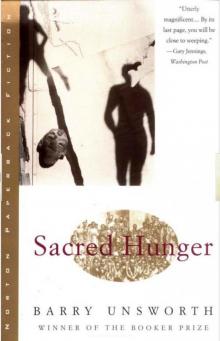 Sacred Hunger
Sacred Hunger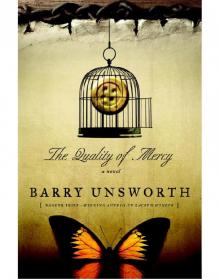 The Quality of Mercy: A Novel
The Quality of Mercy: A Novel The Songs of the Kings: A Novel
The Songs of the Kings: A Novel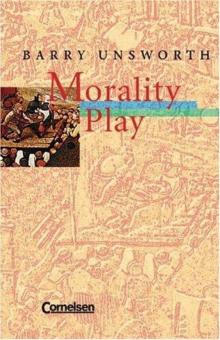 Morality Play. Mit Materialien. (Lernmaterialien)
Morality Play. Mit Materialien. (Lernmaterialien)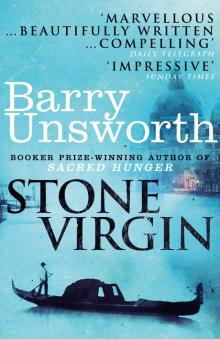 Stone Virgin
Stone Virgin Land of Marvels
Land of Marvels Mooncranker's Gift
Mooncranker's Gift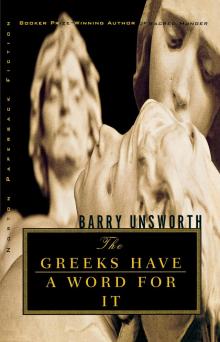 The Greeks Have a Word for It
The Greeks Have a Word for It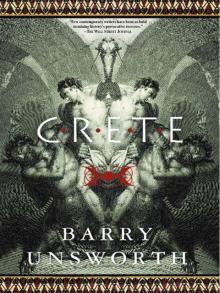 Crete
Crete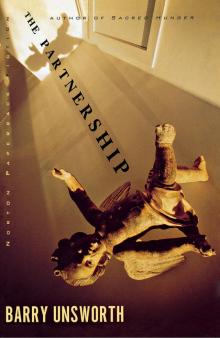 The Partnership
The Partnership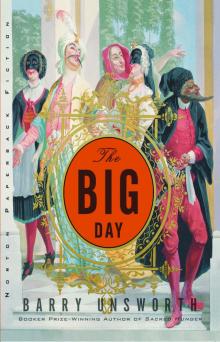 The Big Day
The Big Day The Hide
The Hide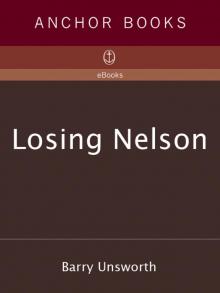 Losing Nelson
Losing Nelson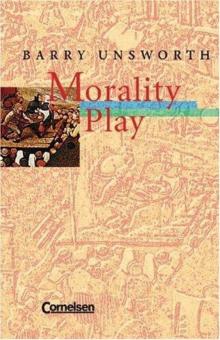 Morality Play
Morality Play Land of Marvels: A Novel
Land of Marvels: A Novel The Ruby In Her Navel
The Ruby In Her Navel